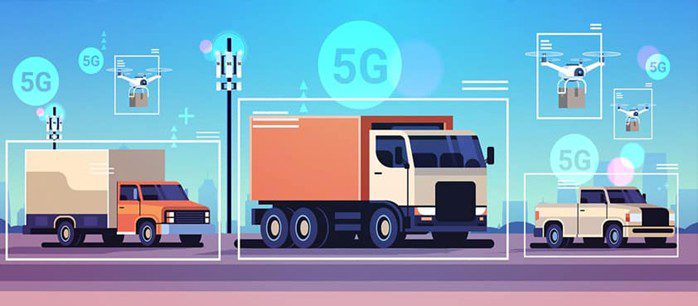
Over-Reliance on AI and Automation Without Sufficient Regulation
At Fast Forward TMS, we recognize the transformative power of AI and automation in trucking and logistics, but we also see the risks that come

At Fast Forward TMS, we are embracing the future of fleet management with the rise of 5G technology, which is transforming the trucking industry at an unprecedented pace. With the increasing need for faster communication, real-time monitoring, and data-driven decision-making, 5G-enabled smart fleet connectivity is setting a new standard for efficiency and innovation. This technology is not just about speed; it’s about creating a more connected and intelligent transportation network that empowers carriers with precise control over their operations.
One of the biggest advantages of 5G in fleet management is its ultra-low latency, allowing for real-time data transfer between vehicles, dispatch centers, and logistics hubs. This means instant GPS tracking, predictive maintenance alerts, and live diagnostics that help carriers prevent breakdowns before they happen. The ability to process vast amounts of data in seconds enables fleet operators to optimize routes, minimize downtime, and enhance overall efficiency. At Fast Forward TMS, we recognize the importance of seamless connectivity, and our platform is built to integrate effortlessly with the latest advancements in fleet technology.
Safety is another game-changer with 5G connectivity. Trucks equipped with AI-powered telematics and vehicle-to-vehicle (V2V) communication can receive real-time hazard alerts, reducing accidents and improving driver safety. Features like automated braking assistance, live dashcam streaming, and emergency response systems ensure that carriers can monitor their fleets with greater precision. As regulatory requirements become stricter, having a smart connectivity solution helps businesses maintain compliance while prioritizing driver and cargo security.

Sustainability is also a key focus as 5G adoption grows in the logistics sector. With enhanced data insights, carriers can monitor fuel usage, track carbon emissions, and implement eco-friendly driving strategies. Optimized routing and reduced idling time translate into lower fuel consumption and operational costs, helping fleets transition to more sustainable logistics practices. As the transportation industry moves toward greener solutions, leveraging 5G technology will be essential for long-term success.
The impact of 5G on trucking is just beginning, and its potential to revolutionize fleet operations is undeniable. Are you prepared to take advantage of 5G-enabled smart fleet connectivity? Have you already integrated 5G solutions into your logistics operations, or are you facing challenges in making the shift? We’d love to hear your insights! Share your thoughts in the comments below and join the conversation on the future of connected trucking.

At Fast Forward TMS, we recognize the transformative power of AI and automation in trucking and logistics, but we also see the risks that come

At Fast Forward TMS, we recognize that extreme weather events are becoming a major challenge for the trucking and logistics industry. From hurricanes and heavy

At Fast Forward TMS, we are always striving to revolutionize the way transportation management operates. One of the most exciting developments in logistics technology today